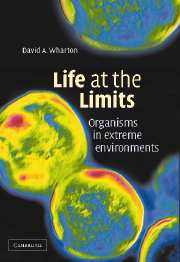3 - Life without water
Published online by Cambridge University Press: 18 August 2009
Summary
As a child, I lived in the Midlands in the centre of England. Family holidays meant a long car journey and I can still remember the excitement of that first rare glimpse of the sea. We feel a similar sense of elation on discovering a waterfall or a lake during a walk in the country or on hearing the patter of rain after a long dry period. Perhaps the emotional response we feel to water is a recognition of how important it is to us and to life in general. For we all know that water is essential for life. However, although it is true that life cannot exist without at least periodic access to water, organisms can live in some very dry places and some can survive the almost total loss of water from their bodies.
Why is water so important? Water comprises by far the largest proportion of the chemical make-up of the bodies of most organisms, usually from 60 to 90 per cent. Indeed, as JBS Haldane once remarked, ‘Even the Pope is 70 per cent water’. Living organisms need metabolic processes which maintain their structure and enable them to move, grow and reproduce. Metabolism involves chemical reactions and these reactions need a medium in which they can take place in a controlled manner. Consider, for example, how organisms get their energy. Energy comes mainly from the oxidation or burning of sugars.
- Type
- Chapter
- Information
- Life at the LimitsOrganisms in Extreme Environments, pp. 92 - 128Publisher: Cambridge University PressPrint publication year: 2002



